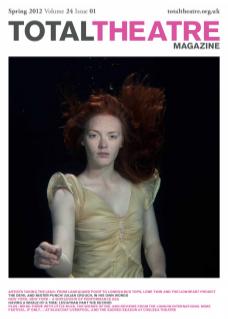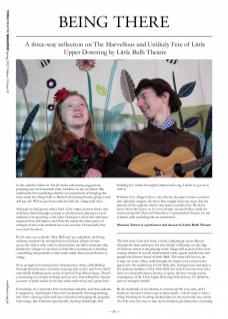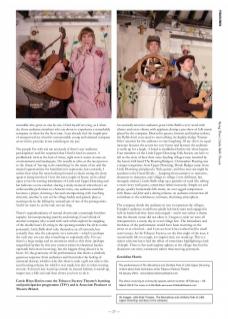As the audience filters in, I’m all smiles and seating suggestions, pumping out our homemade folky melodies on my accordion. But underneath I’m wondering whether our experiment of bringing this show made for village halls to Bristol’s discerning theatre-going crowd will pay off. Will we get them onboard with the village hall vibe?
Although we had grown rather fond of the empty maroon chairs that we’d been delivering light comedy to all afternoon, playing to a real audience is invigorating. Little Upper Downing is a show that welcomes rogue activity and improv, and from the outset this brave party of strangers feed us the ammunition to do just that. Occasionally they even steal the show.
By the time our symbolic ‘Hate Balloons’ are unleashed, involving audience members by having them hurl ‘plastic effigies of hate’ across the aisle at each other to demonstrate the bitter animosity that divides the villages of our story, it feels like a community is forming – something that generally comes ready-made when you perform to a village.
Soon enough we’re immersed in characteristic chaos, rollerblading through farcical scenes of manly weaving, pub revelry and ‘lovey stuff’, only mildly fluffing up the newly re-devised Fog ribbon-dance. There’s a smattering of costume mishaps and our new unravelling Fete banner (a source of pride earlier in the day) sticks mid-reveal; not a great look.
Fortunately, it’s a structure that can harness calamity, and this audience is supportive. And despite Clare and I accidentally throwing bunting into Alex’s shaving-foam-clad face somewhat sabotaging the poignant final image, plus Dominic questionably rhyming Edinburgh with ‘bedding-fur’ within his nightly improvised song, I think we got away with it.
Whether it’s a village hall or a city theatre, the space creates a context that definitely impacts the show. But tonight it hits me anew that the attitude of the audience within that space overrides this. We never know what they’ll give us. So even though our small show made for rural touring isn’t what we’d describe as ‘experimental’ theatre, for me it always ends up feeling like an experiment.
Shamira Turner is a performer and deviser in Little Bulb Theatre
The first time I saw this show, I made a pilgrimage across Devon through the dark and fog to the tiny hamlet of Dunster on the edge of Exmoor, where it was playing in the village hall as part of the rural touring scheme. It was all whitewashed walls, squash and biscuits and people who’d never heard of Little Bulb. This time all I have to do is step out of my office, walk through the theatre foyer and join the queue into the auditorium. It’s all black tabs, boutique beer and quite a few paid-up members of the Little Bulb fan club. From one-time tithe barn to converted tobacco factory, to quote the four-strong roving contingency of the Little Upper Downing Folk Society, ‘it’s different, and yet strangely similar’.
By my standards, at ten minutes to curtain up I’m very early, and I realise it’s because I want to get in there quick – I don’t want to miss a thing. Entering the bunting-decked space to the warm and easy strains of a folk tune that may or may not be familiar, performed by a beaming ensemble who greet us one by one, I find myself envying, as I often do, those audience members who are about to experience a remarkable company or show for the first time. I can already feel the stupid grin of unequivocal joy that this unreasonably young and talented company never fail to provoke in me twitching in my jaw.
The people I’m with ask me anxiously if there’s any ‘audience participation’ and I’m surprised that I find it hard to answer. A problematic term at the best of times, right now it seems at once an overstatement and inadequate. I’m usually as alive as the next person to the threat of ‘having to do something’ in the name of art and the myriad opportunities for humiliation it represents, but curiously, I realise that what I’m most looking forward to about seeing the show again is being involved. Over the next couple of hours, we’re called upon to be the warring inhabitants of Little and Upper Downing and bat balloons at one another; during a sticky moment when there’s an unfavourable performer-to-character ratio, one audience member becomes a player, donning a hat and extemporising with touching sincerity; another is cast as the village baddy and gamely plays a starring role in the felling-by-custard-pie of one of the protagonists. And if we want to, at the end, we can sing.
There’s superabundance of natural charm and a seemingly limitless capacity for incorporating anarchy and mishap (I can’t think of another company who would with such relish exploit the snapping of the double bass’s D-string in the opening number for all its comic potential). Little Bulb don’t take themselves at all seriously, but crucially they take the enterprise very seriously – which is perhaps the only way you can take something so supremely silly. For yes, there’s a huge nudge and an enormous wink to this show (perhaps magnified further by this new context where its theatrical modus operandi feels more knowing), but the biggest thing about it is its heart. It’s the generosity of the performances that elicits a similarly generous response from audiences and that makes the feeling of universal elation, which is why this show is such a gift not only to the rural touring scheme for which it was made, but also to other touring circuits. It doesn’t just stand up outside its natural habitat; it stands up, improvises a folk reel and then shows you how to do it.
Carrie Rhys-Davies runs the Tobacco Factory Theatre’s learning and participation programme (TF+) and is Associate Producer at Theatre Bristol.
An excitedly attentive audience greet Little Bulb’s every word with silence and every silence with applause during a pre-show of folk music played by the company. Dressed in greens, browns and leather jerkins, the Bulbs don’t even need to start talking (in slightly dodgy ‘Farmer Giles’ accents) for the audience to start laughing. I’d say this is in equal measure because the actors are very funny and because the audience is really up for a laugh. A bond is established before the show begins. Four members of the Little Upper Downing Folk Society are here to tell us the story of how their once-feuding villages were reunited by the heroic folk band The Roaring Badgers. Christopher Roaring was a singer-songwriter from Upper Downing, Derek Badger came from Little Downing and played a ‘little guitar’, and they met one night by accident in the Great Divide… Jumping from narrative to narrative, character to character, and village to village (‘very different, but strangely similar’), Little Bulb whip up a pastiche of rural life, telling a sweet story with gusto, sometimes rather raucously. Simple set and props, quality homemade folk music, an over-egged comparison with Romeo and Juliet and a daring reliance on audience interaction all contribute to the celebratory, intimate, charming atmosphere.
The company divide the audience in two to represent the villages. Tonight’s audience would have gladly left their seats and engaged in full-on battle had they been encouraged – and it was rather a shame that the theatre venue did not allow it. I began to wish we were all transported to a sunny day at a real village fete. The immediacy and freshness of the performance would have been stunning on the street or at a festival – and I can see how it has worked well in small rural venues. In the Tobacco Factory, on the first night of the tour, it occasionally felt too rough, too improvised, too stand-up. This is a minor criticism but it had the effect of sometimes highlighting a lack of depth. There is fun and laughter aplenty at the village fete but the characters are witty caricatures rather than moving portrayals.
Geraldine Harris
The performance of The Marvellous and Unlikely Fete of Little Upper Downing written about here took place at the Tobacco Factory Theatre 18 January 2012. www.tobaccofactorytheatre.com
The show is touring to community spaces and art centres 15 February – 25 March 2012. For more on Little Bulb see www.littlebulbtheatre.com


